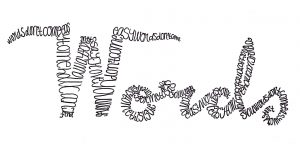They have a word for that in German / Scots / German… (things you can’t say in English Kummerspeck; Guddle & Bourach; Schnapsidee & Fremdschämen)
 If you look at the statistics around the English language you’d think that we already have more than enough words in this ‘language of the World’ – estimates vary between 500,000 and just over 2 million, depending on how you count them.
If you look at the statistics around the English language you’d think that we already have more than enough words in this ‘language of the World’ – estimates vary between 500,000 and just over 2 million, depending on how you count them.
Most educated people, however, use no more than 20,000 words or so, which means that we ought to have plenty to spare. Yet we’ve all had those moments when we want to say something and we can’t find exactly the right word to use.
As much as we like to think of English as the biggest and best of all the World languages, it turns out there’s just some things you can’t express in one word … but you can in other languages. So in this article we look at a few – and if they’re sometimes very funny – well, how good is that!
The weight gained through overeating when grief-stricken
Fairly or unfairly, the Germans have a reputation for being expansive about their food and drink.
Kummerspeck (KOOM-ar-shpek, with the oo as in book) is the Germans’ ideal excuse for putting on unwanted weight. It means literally ‘grief-bacon’, and it refers to the extra weight gained as a result of overeating through grief.
That said, the statistics tell a different story. They show that if anyone needs an excuse for piling on weight it’s the British. English speakers in Europe – the UK and Ireland – occupy two of the top three places in the Organisation for Economic Co-operation and Development’s European league table of obesity.
Guddle – A bit of a mess that can be sorted out
Bourach – a hideous mess that is almost irreparable
Two words to describe a mess that can either be sorted out or is beyond repair.
Bourach (BOO-rackh, where the ckh is pronounced at the back of the throat, as in loch) has several meanings, all of them coming from the original sense of a pile or a heap.
Guddle was originally a verb, which meant to grope around uncertainly under water and, more particularly, to try to catch a fish with your bare hands. From that sense of blind uncertainty, it gained the meaning that it has today.
An off-the-wall idea that comes from a drinking session
We all need something to spark the imagination, to get our thoughts running, and sometimes that something is a couple of drinks. Making decisions after a late-night session is seldom a sensible plan.
The Germans have a word for the sort of idea that results- a schnapsidee (SHNAPS-i-day) is, literally, a ‘boozeidea’, and it’s used to describe a suggestion that is seen as completely impractical.
The empathy felt when someone else makes a complete fool of himself
In English we have of course adopted the antonym of this word – Schadenfreude (SHAH-denJroy- duh), which means the guilty thrill of pleasure felt when someone else comes a cropper.
Fremdschamen (FREMT-shah-mun) literally means ‘foreign-shame’, and it describes the feeling of being embarrassed on someone else’s behalf.It’s a more charitable opposite in German of Schadenfreude.






